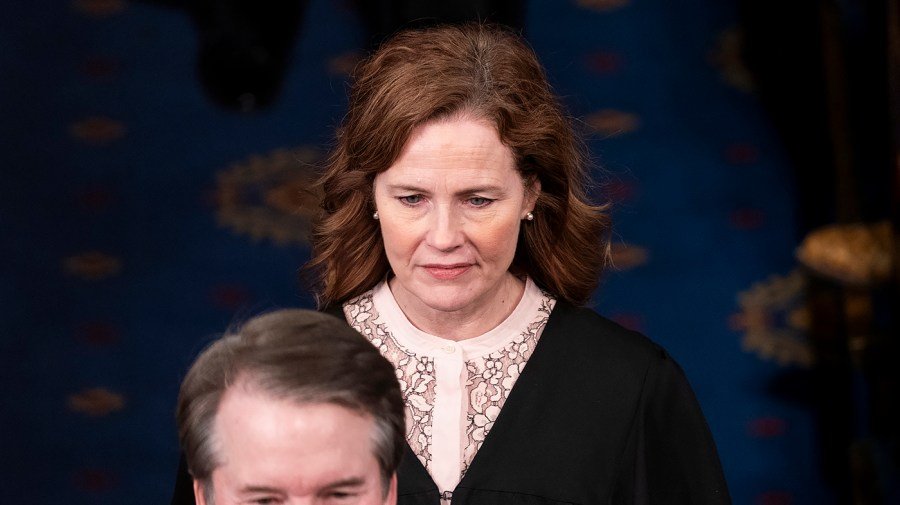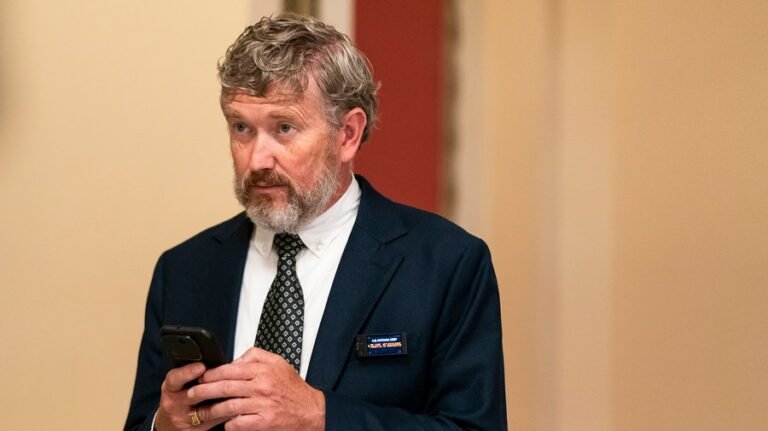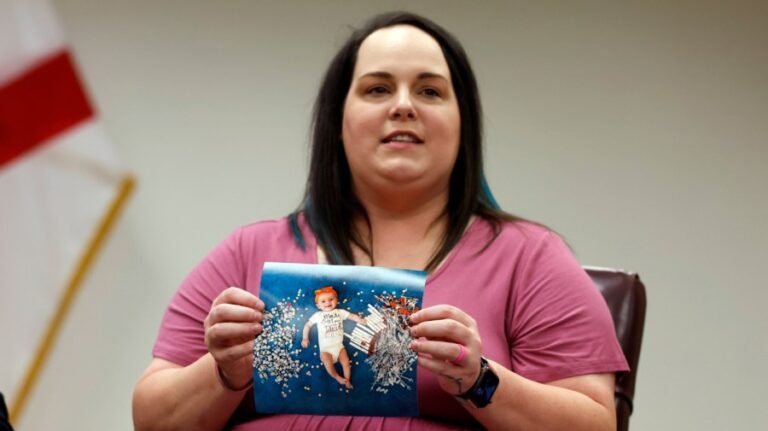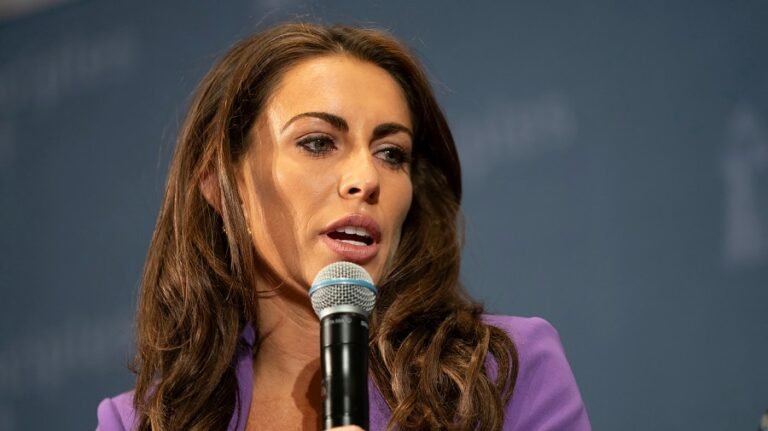
It’s book tour-palooza at the Supreme Court.
Three justices — Amy Coney Barrett, Sonia Sotomayor and Ketanji Brown Jackson — will crisscross the country to make a combined more than two dozen stops this month, soaking up the final weeks of the court’s summer recess to promote their titles.
The blitz of appearances breaks from the justices’ usual push to steer clear of public interviews, a more unwieldy forum than the written opinions through which they typically divulge their views.
But to sell copies, they’ll have to sign book covers on top of the court’s decisions.
Most of the attention is on Barrett, whom many court watchers view as one of the most interesting — and often most unpredictable — justice.
On Tuesday, she’ll release her first book since President Trump nominated her to the court in 2020. Titled “Listening to the Law,” Barrett has billed it as an inside look at her journey and work, including her deliberation process and dealings with media scrutiny.
The first excerpts surfaced Tuesday in a report from CNN. Barrett defends her pivotal vote to overturn Roe v. Wade, condemning the 1973 decision establishing the constitutional right to an abortion as “getting ahead of the American people.”
“(T)he Court’s role is to respect the choices that the people have agreed upon, not to tell them what they should agree to,” Barrett wrote, according to CNN.
Barrett declined The Hill’s request for an interview through her publisher.
Her book tour unofficially kicks off this Thursday when she’ll sit down with The Free Press’ Bari Weiss at Lincoln Center in New York City. Tickets sold out in three hours, event organizers said (the venue seats roughly 1,100 people).
After New York, Barrett on Saturday will be back in the nation’s capital at the National Book Festival, where she’ll sit down with David Rubenstein, the billionaire co-founder of the Carlyle Group.
Then, she’ll move to the presidential library circuit. She’ll head to California for events next week at the Nixon and Reagan libraries and later Texas for a stop at the Johnson library.
Barrett is also set to drop by Notre Dame, where she previously taught, along with stops in Chicago and Philadelphia.
The sudden burst in her public appearances comes with its financial benefits, as we detailed in a previous edition of The Gavel. Barrett has already disclosed $425,000 in royalties, and her deal reportedly included a $2 million advance.
Meanwhile, Sotomayor — the most prolific author among the sitting justices — will make the rounds for her new children’s picture book, “Just Shine! How to Be a Better You.” It comes out the same day as Barrett’s title.
Sotomayor will begin her tour at Washington University in St. Louis next week. Then, she’ll hold events in places like Baltimore, New York City, Lake Forest Park, Wash., and San Francisco.
As those two tours commence, Jackson is extending the tour for her memoir, “Lovely One.” It has now stretched into its second year.
Last night, she appeared for a book event in Charleston, S.C. She’s headed to North Carolina Agricultural and Technical State University tonight, and Jackson also has other upcoming stops in North Carolina at Princeton University.
But wait, there’s more…: Retired Justice Anthony Kennedy’s memoir (which has been shortened from two volumes to one) comes out Oct. 18. He’s already announced an event with Rubenstein in New York next month to promote it.
Are you attending any of the book events? We want to hear from you. Drop us a note at zschonfeld@thehill.com and elee@thehill.com.
Welcome to The Gavel, The Hill’s weekly courts newsletter from Ella Lee and Zach Schonfeld. Reach out to us on X (@ByEllaLee, @ZachASchonfeld) or Signal (elee.03, zachschonfeld.48).
DC grand jurors reject crime crackdown
A closed-door resistance is building to Trump’s crime crackdown in the nation’s capital.
Grand juries in Washington, D.C., have declined to indict at least seven times in recent weeks as prosecutors have sought charges amid a push for more stringent law enforcement.
In court filings Monday, a lawyer for Nathalie Rose Jones — an Indiana woman accused of threatening Trump’s life — revealed in court filings that a grand jury “found no probable cause” to indict her.
“Given that finding, the weight of the evidence is weak,” wrote Mary Manning Petras, an assistant federal public defender. “The government may intend to try again to obtain an indictment, but the evidence has not changed and no indictment is likely.”
Federal prosecutors separately informed a magistrate judge that a grand jury declined to indict Edward Dana, another man accused of threatening the president, his public defender, Elizabeth Mullin, confirmed to The Gavel.
The failure to indict adds to a mounting record that shows grand juries made up of local Washington residents refusing to sign off on the administration’s bid to get tough on local crime.
Last week, federal prosecutors failed to secure a felony indictment against former Justice Department employee Sean Dunn, who became a symbol of opposition in the city after he was filmed tossing a sub sandwich at a U.S. Customs and Border Protection agent.
“Why are you here?” Dunn allegedly yelled at the agents. “I don’t want you in my city!”
Grand jurors similarly declined to indict Alvin Summers, who was hit with one count of assaulting, resisting or impeding a federal law enforcement officer after fleeing a U.S. Park Police officer on the National Mall, court papers show.
And, on top of that, three grand juries would not indict Sidney Lori Reid on a federal assault charge tied to a tussle with an FBI agent, the government said in court filings.
The pattern is extraordinary, to say the least.
Grand juries rarely decline to indict — social media last week lit up with jokes invoking the legal adage that a grand jury would “indict a ham sandwich” — but it’s becoming more common as cases linked to Trump’s crackdown are put before the panels of local residents.
The U.S. Attorney in Washington, Jeanine Pirro, instructed her office last month to maximize criminal charges against those arrested in connection with the crackdown on street crime. A spokesperson for her office told The New York Times that she directed her staff to “charge the highest crime that is supported by the law and the evidence.”
But the grand jury vetoes appear to be a rebuke of those marching orders.
In some instances, it’s forced prosecutors to reassess their cases.
The charges against both Dunn and Reid were dropped to misdemeanors after prosecutors failed to indict. In Summers’s case, prosecutors dismissed the charge against him altogether, albeit without prejudice, meaning it could be brought again in the future.
Still, that hasn’t deterred Pirro, who said in a post to X Tuesday that there were more than 200 arrests and “almost” 20 guns seized over Labor Day weekend. She said that brings the number of arrests to 1669 since Trump’s “surge” began, with 168 guns off the street.
“We continue to fight the fight,” Pirro said. “We continue to try to make D.C. safe.”
Trump pushes for DC death penalty expansion
It’s not just grand juries coming into play in Trump’s crime crackdown in the nation’s capital.
Trial juries will play a significant role, too, as Trump pushes to expand the death penalty for anyone who commits murder in the city.
“If somebody kills somebody in the capital — Washington, D.C. — we’re going to be seeking the death penalty and that’s a very strong preventative,” Trump said at a Cabinet meeting last week.
The death penalty is exceedingly rare in the nation’s capital. The D.C. Council repealed it in 1981 and residents a decade later rejected a referendum to restore it, meaning cases must be brought at the federal level for capital punishment to potentially apply.
Though federal prosecutors can bring death-penalty-eligible charges in some cases, homicide cases are often handled locally.
It remains to be seen whether Trump will push for changing D.C.’s laws, have his Justice Department get involved in more cases or take other formal action.
Regardless, the administration may face a more daunting hurdle: convincing D.C. jurors to sign off at trial.
City residents are primarily Democrats, and Gallup has found that only 38 percent of Democrats support the death penalty, compared to 82 percent of Republicans.
D.C.-specific polling data on the issue is scant, but in a survey conducted last year by the Public Religion Research Institute, the group found that just 40 percent of D.C. residents believe the death penalty should be legal in all or most cases, lower than any of the 50 states.
The push is the latest sign of the administration’s aggressive approach to the death penalty.
As one of his Day 1 orders, Trump directed Attorney General Pam Bondi to pursue the death penalty in cases of murdered law enforcement officers or when a capital offense is committed by someone in the country illegally. Trump also ordered Bondi to seek the overturning of Supreme Court precedents limiting the death penalty.
On Tuesday, Florida Attorney General James Uthmeier (R) sent a letter to Bondi and White House Counsel David Warrington on behalf of 15 red states pushing for the overturning of Kennedy v. Louisiana, a 2008 decision that prohibits states from executing people for crimes where it did not and was not intended to result in death.
Uthmeier wants to overrule it so Florida and other states can resume the death penalty in child rape cases.
“We have every confidence that, with President Trump’s strong leadership and with principled, rule-of-law Justices on the Supreme Court, Kennedy‘s days are numbered, and child rapists can be appropriately punished for their unspeakable crimes,” the letter reads.
Criminal case against WI judge to move forward
A federal judge will allow the criminal case against a Wisconsin judge accused of helping a man evade arrest by immigration authorities to proceed.
It means that Milwaukee County Circuit Judge Hannah Dugan will likely stand trial over the incident that seemed to heighten President Trump’s war against the judiciary to new levels.
U.S. District Judge Lynn Adelman last week rejected the state judge’s motion to dismiss the charges against her. Dugan contended she has only acted in her official capacity and thus is immune from prosecution.
“The dispute between the parties boils down to this: Defendant posits a general rule of immunity, subject to certain exceptions which account for the previous (and legitimate) prosecutions of judges,” Adelman wrote in a 27-page decision. “According to the government, there is no general rule of immunity, and what defendant calls exceptions are simply examples of the types of prosecutions that have been brought against judges.
“A review of the relevant history reveals the government has the better of the argument,” the federal judge added.
Adelman’s decision to keep the criminal case intact affirmed a magistrate judge’s July recommendation to let it proceed.
Prosecutors say that after Dugan learned Immigration and Customs Enforcement (ICE) agents sought to arrest Eduardo Flores-Ruiz for being in the U.S. without permanent legal status, she led him and his lawyer out of her courtroom through a back door.
Dugan was arrested in April, inside the courthouse where she worked, and indicted in May on two federal charges for obstruction and concealing an individual from arrest. The judge was ordered suspended while the case proceeds.
In her motion to dismiss, Dugan argued that judges are “not above the law” but they do enjoy a judicial immunity with “deeper roots than the Republic itself.” She claimed judicial immunity applies only when acts fall “wholly or partly” within a judge’s official functions.
“The Court faces the duty, then, of dismissing the indictment now,” the May motion read. “These proceedings have been barred from the start.”
Federal prosecutors meanwhile said Dugan cited “no case” in which a court dismissed an indictment on that basis, or over the separation of powers, suggesting that neither ground has merit. They argued that she ultimately asked the court to develop a “novel doctrine” of judicial immunity from criminal prosecution to be applied distinctly to her case.
In the end, Adelman found the government’s arguments more persuasive. Adelman was nominated to the bench by former President Clinton.
“There is no basis for granting immunity simply because some of the allegations in the indictment describe conduct that could be considered ‘part of a judge’s job,’” Adelman ruled.
A trial date has not yet been scheduled.
Sidebar
5 top docket updates
- National Guard blocked: A federal judge ruled that National Guard troops violated the law in Los Angeles when Trump deployed them in June after immigration protests that turned violent.
- Guatemalan children grounded: A federal judge temporarily halted the planned deportation of hundreds of unaccompanied Guatemalan children from the U.S.
- Trump tariffs struck down: A federal appeals court rejected Trump’s assertion that emergency powers justify his worldwide tariffs in a 7-4 decision.
- Cook’s first court hearing: Federal Reserve board of governors member Lisa Cook sued over Trump’s attempt to oust her from the central bank, spurring a hearing where a federal judge acknowledged that the case raises questions the courts may not have mulled before.
- Supreme Court gets Louisiana brief: Louisiana urged the Supreme Court to bar any consideration of race in redistricting in response to the court’s call for additional briefing on the matter, abandoning its defense of its own current congressional map in a move that could reshape the Voting Rights Act (VRA).
In other news
- Benched another year: The U.S. Court of Appeals for the Federal Circuit said Friday it will adopt a recommendation to extend the suspension of Judge Pauline Newman, the court’s 98-year-old, longest-serving judge, for another year. It cited her refusal to undergo certain medical examinations as part of an internal investigation into her fitness as reason.
- Am I the Drama? Los Angeles County Superior Court Judge Ian Fusselman let jurors submit written questions for witnesses in rapper Cardi B’s civil assault trial, a rarity reported by ace legal reporter Meghann Cuniff. The jurors had no questions for Cardi B but did have questions about her, Cuniff reported.
- Latest YSL twist: A defendant in Fulton County, Ga.’s racketeering case against the alleged Young Slime Life (YSL) gang and a defense attorney, who met and fell in love during the trial, are expecting a baby.
On the Docket
Don’t be surprised if additional hearings are scheduled throughout the week. But here’s what we’re watching for now:
Today:
- No notable court hearings scheduled.
Thursday:
- A federal judge in Massachusetts is set to hold a hearing on the Trump administration’s motion to dismiss a lawsuit challenging the president’s executive order on elections brought by 19 Democratic state attorneys general.
- A federal judge in Washington state is set to hold a hearing considering whether to pause his ruling blocking the enforcement of the Trump administration’s ban on transgender troops pending appeal.
Friday:
- The Supreme Court will release orders.
- The U.S. Court of Appeals for the District of Columbia Circuit is set to hear oral arguments in the Trump administration’s appeal of a judge’s order to continue providing gender-affirming care to transgender prison inmates.
- A federal judge in Washington state is set to hold a preliminary injunction hearing in a lawsuit brought by 16 Democratic state attorneys general against the Education Department, over its discontinuation of mental health funding.
Monday:
- A federal judge in Minnesota is set to hold a hearing over the Trump administration’s motion to dismiss a lawsuit brought by the state over the president’s threats to deprive Minnesota schools of federal funding unless the state attorney general reverses an opinion that said transgender athletes must be allowed to participate in school sports aligned with their gender identity, regardless of the administration’s Title IX interpretations.
What we’re reading
- Politico’s Jennifer Scholtes and Kyle Cheney: Congress hankers for closure in funding war with Trump. SCOTUS is slow to deliver.
- The Associated Press’s David Fischer: Final preparations for trial of man accused of attempting to assassinate Trump in Florida
- Reuters’s Foo Yun Chee: Exclusive: Google set to face modest EU antitrust fine in adtech investigation, sources say
- BBC’s Ione Wells: Trial of Brazil’s ex-President Bolsonaro enters final phase
- The Guardian’s Olivia Empson: Illinois launches LGBTQ+ legal hotline amid Trump-led onslaught


